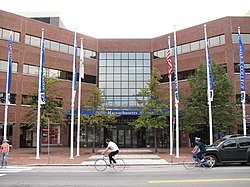Cambridge College
 | |
| Motto | My Life. My College. |
|---|---|
| Type | Private non-profit[1] |
| Established | 1971 |
| Endowment | $11.1 million[2] |
| President | Deborah Jackson |
| Undergraduates | 1,209[3] |
| Postgraduates | 1,591[3] |
| Location | Boston and Springfield , , |
| Campus | Urban |
| Colors | Blue & White |
| Website | cambridgecollege.edu |
Cambridge College is a private, non-profit college based in Boston, Massachusetts.
It offers programs toward undergraduate and graduate degrees in education, counseling, psychology, management, health care management, and human services. Cambridge College operates regional centers in Lawrence, Massachusetts, Springfield, Massachusetts, and Rancho Cucamonga, California. .[4]
Degree programs[]
Cambridge College grants Bachelor of Science and Bachelor of Arts degrees in human services, psychology, management studies and multidisciplinary studies. All bachelor's degree programs are designed for adult learners, ideally those with some work experience. As of 2016, the undergraduate degrees in general business administration and management were the most popular majors at the college.
The School of Education offers graduate teacher and educational administrator preparation and licensure programs leading to Master of Education and Doctor of Education degrees, or to the Certificate of Advanced Graduate Study. The National Institute for Teaching Excellence in Cambridge combines a five-week summer program for adult students with an on-line or local-campus component and leads to a graduate degree in education.
The School of Management grants Master of Management and the Master of Management in Health Care degrees. Students enrolling in the health care managerial competencies degree program must have 3–5 years of experience.
The School of Counseling and Psychology offers several different Master of Education in Counseling Psychology degrees. Several of these degrees fulfill requirements for the educational portion of the licensure process in the states of Massachusetts and Connecticut. A Certificate of Advanced Graduate Studies (CAGS) is also available in Counseling and Psychology.
The college is one of 1,900 "military-friendly" institutions belonging to the Servicemembers Opportunity Colleges (SOC) consortium.[5]
History[]

Founding[]
Cambridge College had its beginnings as an innovative graduate program created by Eileen Moran Brown and Joan Goldsmith in the newly created Institute of Open Education (IOE) in 1971 formed by John Bremer at Newton College of the Sacred Heart.[6] Students in education programs were given individual attention: for example, through critiques of videotaped student performance on the job. Within two years, Brown and Goldsmith were directing the IOE, and later affiliated the IOE with Antioch College, where Brown was named Dean. In 1979, Brown began the 18-month process of elevating the graduate program to an independent, fully accredited institution that was named Cambridge College.
1990s[]
A 2003 article in The Wall Street Journal reported that in 1996, the New England Association of Schools and Colleges had cited "quality control of academic achievement" as an "issue of overriding concern which is central to the academic credibility of the college" with reference to the graduate program in education.[7] The article discussed the lack of rigorous entrance requirements and grade inflation in the program as areas of concern.[7]
2000s[]
John Bremer was invited to Cambridge College (2005–08) where he was appointed to the Elizabeth J. McCormack Chair in the Humanities.[8]
In 2017, Cambridge College consolidated its four locations in Cambridge into a single campus in the Hood Office Park in Charlestown, a neighborhood of Boston.[9]
Accreditation[]
Cambridge College is accredited by the New England Association of Schools and Colleges.[10]
The College is authorized to operate by the California Bureau for Private Post-Secondary and Vocational Education, and the Council on Higher Education of Puerto Rico.[11]
Notable alumni[]
- Larry Garron (Class of 1985)[12]
- Brad Hatfield, professor at Berklee College of Music[13]
Notes and references[]
- ^ "College Navigator: Cambridge College". National Center for Education Statistics.
- ^ As of June 30, 2011. "U.S. and Canadian Institutions Listed by Fiscal Year 2011 Endowment Market Value and Percentage Change in Endowment Market Value from FY 2010 to FY 2011" (PDF). National Association of College and University Business Officers. January 17, 2012. p. 22. Archived from the original (PDF) on 2013-10-29. Retrieved February 21, 2012.
- ^ Jump up to: a b "College Navigator". U.S. Department of Education. Retrieved 2009-04-19.
- ^ "Locations - Cambridge College". www.cambridgecollege.edu. Retrieved 27 May 2018.
- ^ American Association of State Colleges and Universities. "SOC Consortium". Archived from the original on 2011-03-19. Retrieved 2010-09-15.
- ^ John Bremer (January 11, 2008). "It Became Cambridge College".
- ^ Jump up to: a b Daniel Golden (22 September 2003). "Colleges Ease Way For Teachers to Get Advanced Degrees". The Wall Street Journal. Full article online at [1] Archived 2011-06-29 at the Wayback Machine
- ^ "Archived copy". Archived from the original on 2011-07-25. Retrieved 2011-01-17.CS1 maint: archived copy as title (link)
- ^ Seth Daniel (August 5, 2017). "Cambridge College Ready for Move to Charlestown". Charlestown Patriot-Bridge. Retrieved September 17, 2017.
- ^ New England Association of Schools and Colleges. "Cambridge College".[permanent dead link]
- ^ "Accreditation and Authorizations | Cambridge College". Cambridgecollege.edu. Retrieved 2018-05-27.
- ^ "Lawrence 'Larry' Garron Jr., 82, Boston Patriot, President of Roxbury Manufacturing, and Bunker Hill Community College Department Dean". Framingham Source. Retrieved 2020-01-09.
- ^ "Brad Hatfield". Berklee.edu. Retrieved 2020-01-09.
External links[]
Coordinates: 42°22′8.0″N 71°6′39.2″W / 42.368889°N 71.110889°W
- Private universities and colleges in Massachusetts
- Educational institutions established in 1971
- Universities and colleges in Boston
- 1971 establishments in Massachusetts
- Private universities and colleges in California
